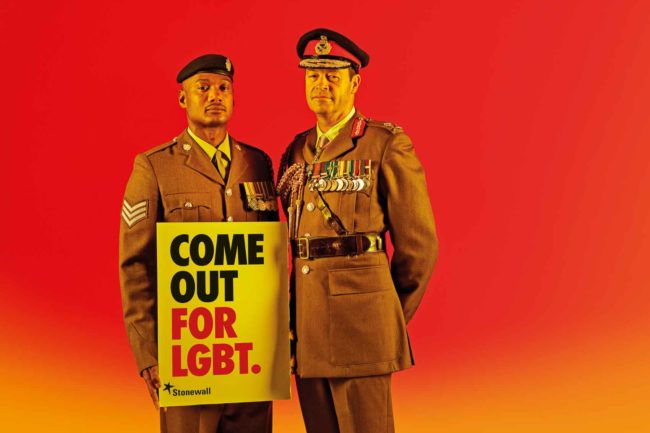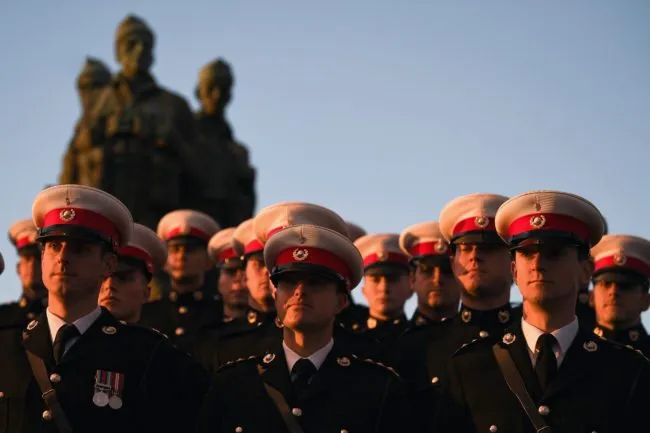British Army equality ad campaign met with anti-LGBT backlash

(Photo by Army Jobs/Facebook)
The British Army has released its ad campaign which lauds different sexualities, ethnicities and faiths after being criticised for being too “politically correct”.
The £1.6 million “This is Belonging” campaign answers whether hopeful troops can be “gay”, “emotional” and “practice their faith” in the army.
General Nick Carter, Chief of General Staff, defended the series of adverts because he insisted that the army needed to appeal to people other than young, white men.
The series of equality-boosting ads came as an answer to the failed campaign which called for the “be the best” slogan the Army had adopted for years to be scrapped.
Defence Secretary Gavin Williamson decided to halt plans to get rid of the slogan after research found that people perceived it to be “dated, elitist and non-inclusive”.
The new video, which was shared on Facebook by Army Jobs, has been criticised for having “too much focus on diversity and equal rights and not enough on just focusing on enlisting quality over quota”.
One person wrote: “Your sexuality or race does not matter, however, the fact our army is now recruiting based on political correctness rather than ability concerns me…”
Another said: “Pointless advertising campaign. How about spending this money on the injured veterans instead?”
“British army is turning into a joke,” another said.

Related: British Army officials confront homophobia in new Stonewall campaign
Other comments had more explicit anti-LGBT sentiments.
“That why they call it the front line, you all line up and let the sergeant drill you,” one person wrote.
“Only if you come in the back door,” someone else wrote.
There is growing concern over recruitment to the armed forces as in the year to April 2017, just 12,950 recruits joined the regular armed forces, but 14,970 service personnel left in the same period.
A report commissioned by Downing Street found that The Royal Navy and the RAF were running at around 10 percent short of their annual recruitment target, while the Army shortfall was more than 30 percent.
Some argue that by appealing to a more diverse pool of people it will help to boost numbers.
Major General Tim Cross told the Today programme in January that he supported recruitment of gay people as well as people from different faiths as long as the army could continue to “duff up the Queen’s enemies”.
“We must ensure that we reach out to people, we must ensure that everybody knows that they have an opportunity of joining the British armed forces and joining the Army in particular, but we are not going to be soft and we are not going to be nice to people,” Major General Cross said.
General Carter added that white, male, Caucasian 16 to 25-year-olds make up the “traditional cohort”, but “there are not as many of those around as there once were.”

(Photo by Jeff J Mitchell/Getty Images)
“This campaign is a recognition that we don’t have a fully manned army at the moment, that the demography of our country has changed, and that we need to reach out to a broader community in order to man that army with the right talent.
“It is entirely appropriate for us, therefore, to try and reach out to a much broader base to get the talent we need in order to sustain that combat effectiveness,” he said.
However, other top officials have rallied behind the public criticism.
Richard Kemp, a now-retired colonel who was a former commander of British operations in Afghanistan, said that the campaign would do the opposite of solving the recruitment problem that the forces are facing because it was “neglecting the main group of people who are interested in joining”.
“The army, like the rest of government, is being forced down a route of political correctness,” he said to BBC Breakfast. “What is most important is that the army is full of soldiers. It is of secondary importance that they reflect the composition of society.”
Iain Duncan Smith, a former shadow secretary of State for Defence, said that the adverts were too negative in tone and should be promoting the family structure of the forces.
He told Good Morning Britain: “When you’re under fire the people on your left and right are your family, they protect you, you protect them, their lives matter to you. I would like to see a lot more of it couched in terms like that rather than, ‘Me, personally, can I express myself?’.”

